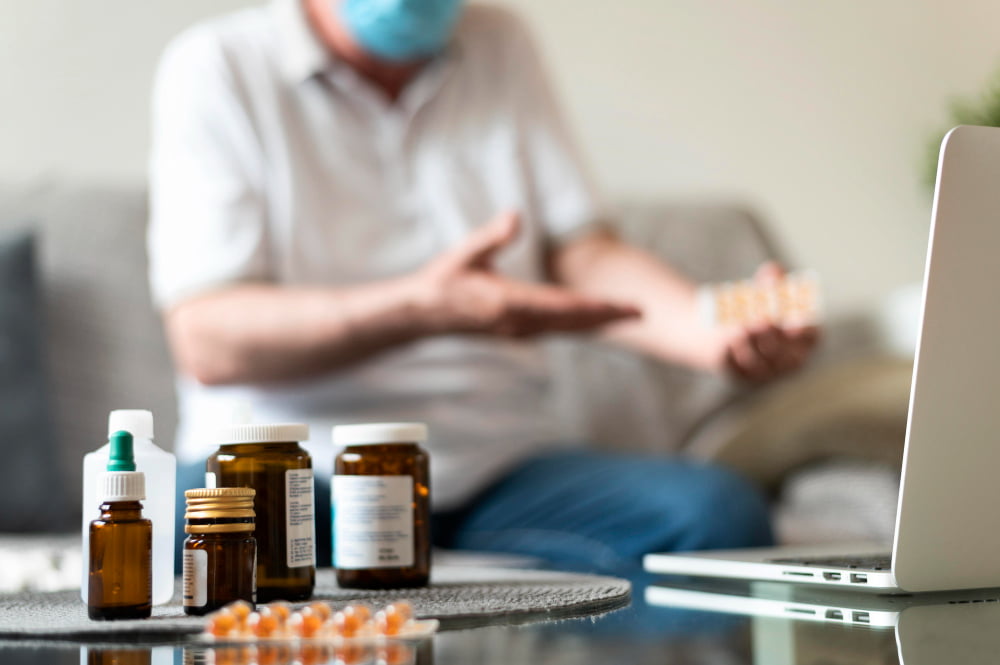Treatment for Prescription Drug Addiction
Prescription drug addiction is a severe problem that affects millions of people worldwide. It can lead to devastating consequences, including physical and mental health problems, strained relationships, and financial instability. Seeking treatment for prescription drug addiction is essential for recovery and a return to a fulfilling life. In this blog post, we’ll discuss the types of prescription drugs that can be addictive, the symptoms of addiction, and treatment options.
Additionally, we’ll provide information on sober living in California and other resources to help individuals on their journey to recovery. Whether you or a loved one are struggling with prescription drug addiction, it’s essential to know that help and healing are possible.
Types of Prescription Drugs that can be Addictive
Prescription drug addiction is a form of substance abuse involving prescription medication misuse. Many prescription drugs have the potential to be addictive, including:
Opioids
Opioids are pain-relieving medications that can be highly addictive. They work by binding to the opioid receptors in the brain and reducing pain perception. Common opioids include oxycodone, hydrocodone, codeine, and fentanyl. When these drugs are abused, they can cause feelings of euphoria, relaxation, and sedation.
Benzodiazepines
Benzodiazepines are used to treat anxiety and sleep disorders. They enhance the effects of a neurotransmitter called gamma-aminobutyric acid (GABA), which can aid in reducing anxiety and promote sleep. Common benzodiazepines include Xanax, Valium, and Klonopin. When these drugs are abused, they can cause feelings of relaxation, drowsiness, and sedation.
Stimulants
Stimulants are medications used to treat attention-deficit hyperactivity disorder (ADHD) and narcolepsy. They work by elevating the levels of dopamine and norepinephrine in the brain, which can enhance focus and alertness. Common stimulants include Adderall, Ritalin, and Concerta. When these drugs are abused, they can cause feelings of euphoria, increased energy, and diminished appetite.
Other Prescription Drugs with Addiction Potential
In addition to opioids, benzodiazepines, and stimulants, other prescription drugs can be addictive. These include sleep aids, muscle relaxants, and antidepressants. When these drugs are abused, they can cause a range of physical and psychological effects.
Signs and Symptoms of Prescription Drug Addiction
Prescription drug addiction is a severe and growing problem in the United States. Many people in the U.S. have misused prescription drugs.
Here are some physical, behavioral, and psychological symptoms to watch out for:
Physical symptoms
- Drowsiness and nodding off frequently
- Slurred speech and trouble speaking clearly
- Nausea and vomiting after taking pills
- Loss of coordination and difficulty walking or standing without stumbling
- Constricted or dilated pupils, depending on the medication being taken
- Shifts in appetite, eating more or less than usual
- Disrupted sleep patterns, trouble falling or staying asleep
- Unexplained weight loss or gain
Behavioral symptoms
- Doctor shopping, going to multiple doctors to get prescriptions
- Taking more pills than prescribed or taking them more frequently
- Engaging in risky behaviors, such as driving while under the influence of prescription drugs
- Neglecting responsibilities at work, school, or home
- Withdrawal from friends and family
- Continuing to use prescription drugs despite negative consequences
Psychological symptoms
- Anxiety or panic attacks
- Depression or feelings of hopelessness
- Mood swings and irritability
- Confusion and trouble concentrating
- Memory problems and forgetfulness
- Paranoia or feeling like others are out to get you
If you or your partner is abusing prescription drugs, seeking professional help is essential. A healthcare provider can diagnose prescription drug addiction and organize a treatment plan according to your needs. Recovery is possible; seeking help is the first step toward a healthier and happier life.

Prescription Drug Addiction Treatment
Detoxification
The first step in treating prescription drug addiction is often detoxification. This process involves safely and gradually reducing the amount of the drug in the body to help manage withdrawal symptoms. Because withdrawal from prescription drugs can be dangerous, it’s essential to undergo detoxification under the care of a medical professional.
Inpatient Treatment
Inpatient treatment programs deliver round-the-clock care and support for individuals struggling with prescription drug addiction. These programs typically involve a combination of individual and group therapy, behavioral therapy, and medication-assisted treatment (MAT). MAT consists of using medications to help manage withdrawal symptoms and cravings.
Outpatient Treatment
Outpatient treatment programs allow individuals to procure treatment at home. These programs typically involve individual and group therapy, behavioral therapy, and MAT. Outpatient treatment can be a vital option for individuals with milder addictions or those who have completed inpatient treatment.
Behavioral Therapy
Behavioral therapy is an essential component of prescription drug addiction treatment. It involves working with a therapist to identify and alter negative thought patterns and behaviors contributing to drug abuse. Common behavioral therapy types used in prescription drug addiction treatment include cognitive-behavioral therapy (CBT) and contingency management.
Support Groups
Support groups can be valuable resources for recovering from prescription drug addiction. These groups deliver a supportive and non-judgmental environment where individuals can share their life experiences and receive encouragement from others who have been through similar struggles.
Developing a Plan for Long-Term Recovery
Developing a plan for long-term recovery is essential to prescription drug addiction treatment. This may involve ongoing therapy, support group attendance, and healthy lifestyle changes. Developing healthy coping mechanisms and strategies for dealing with triggers and stressors that may lead to relapse is also essential. With the proper treatment and support, overcoming prescription drug addiction and leading a fulfilling life in sobriety is possible.
Conclusion
In conclusion, prescription drug addiction is a serious issue affecting millions across the United States. Understanding the causes, risks, and signs of prescription drug abuse is essential to prevent addiction and seek help when needed. There is hope if you or your partner is struggling with prescription medications.
Treatment options such as detox, counseling, and therapy are available to help individuals overcome addiction and achieve long-term recovery. Remember, recovery is a journey that requires patience, dedication, and support. Individuals can start living healthier and more fulfilling life by taking the necessary steps to address prescription drug addiction.




